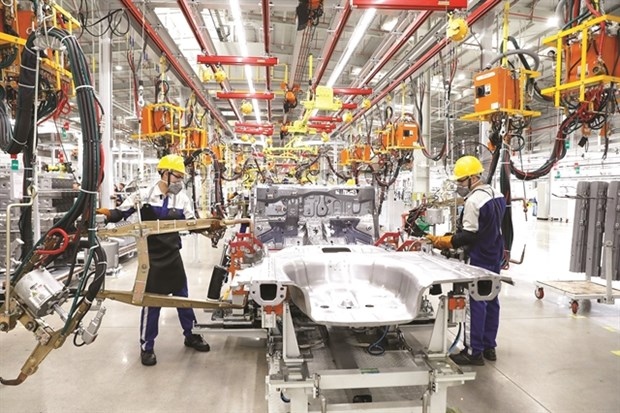Vietnam’s auto industry needs deeper involvement in global supply: experts
Vietnamese enterprises in the auto industry are not deeply involved in the global supply chain. To become global suppliers, domestic enterprises must be consistent with the management culture and business philosophy of global manufacturers, experts have said.

This is a long-term accumulation process with no shortcuts that Vietnamese businesses must overcome if they want to join deeply in the global supply chain, said experts.
Phan Dang Tuat, chairman of the Vietnam Association of Supporting Industries (VASI), said before the fourth industrial revolution, people paid significant attention to the industrial development level of a country involving in automotive, electronics and chemical industries.
A recent study by Toyota Motor Vietnam (TMV) showed that more than 75% of Vietnamese enterprises frequently encountered problems in production methods, standardisation of operations, and product quality control.
Most of them did not have managerial tools to control product processes or delivery schedules causing waste and large inventory.
Tuat said the automobile industry combined all quintessence of technologies, production methods and modern management methods.
He noted the learning experience of production and corporate governance from developed countries and global leading auto manufacturers was very important for Vietnamese enterprises in international integration.
In early July, the Industry Agency under the Ministry of Industry and Trade and Toyota Motor Vietnam (TMV) signed a memorandum of understanding on a cooperation project to help domestic businesses in the automobile supporting industry improve their capacity and enhance the connectivity between them and car assemblers.
This is the fourth year the two sides have inked a cooperation deal to assist domestic firms to raise the rate of locally made components in automobiles.
After three years of cooperation, TMV has recruited one official supplier and selected seven potential suppliers as well as conducted training for 60 Vietnamese suppliers.
The total number of localised products in the automobile supporting industry has reached nearly 1,000 products of all kinds.
Tuat said manufacturing a car with tens of thousands of components needed scientific production and management systems.
He said only through cooperation and continuous learning could Vietnamese enterprises improve their product quality to grasp the opportunity to become a part supplier for global automobile manufacturers.
On July 18, TMV and VASI just signed a Memorandum of Understanding (MoU) to support VASI members in building their capabilities and linkages to automobile assemblers. This project will be implemented from 2023 to 2024. Specifically, Toyota Vietnam and VASI will implement two main activities, screening and making a list of potential auto part suppliers to connect with automobile assemblers in Vietnam, and implementing an operational improvement support program for a number of domestic suppliers to improve the production process.
Pham Thanh Tung, deputy general director of TMV, said related enterprises had not yet become main suppliers for Toyota, but they had been able to cut production costs, increase labour productivity, and create a better working environment.
In addition, TMV had worked with suppliers to develop a closed green cycle, in an effort to reduce CO2 emissions in all stages of the product life cycle at the supplier. As a result, Toyota’s suppliers reduced their emissions by 6,462 tonnes of CO2 in 2022.
Tran Thi Kim Que, gederal Director of Phong Nam Co., Ltd. said “When we are offered this support, we will be able to stand on our own two feet, with our own knowledge. The most difficult thing is how to convey those positive energies to all middle-level managers and continue to transmit them to employees.
"We should take workers and employees as the centre of operations and support them because they are the ones who make the final product.”
Sharing the view with Que, many small- and medium-sized enterprises have the desire to become professional suppliers for Foreign Direct Investment (FDI) enterprises in Vietnam.
They also wish to have a production management system that can meet the strict requirements of fastidious markets such as Japan, the US, and Europe.
